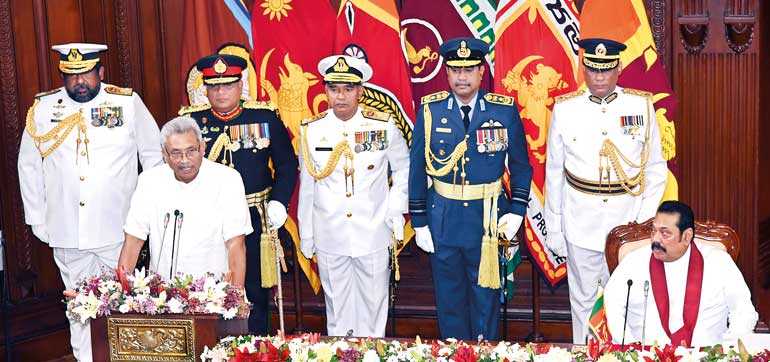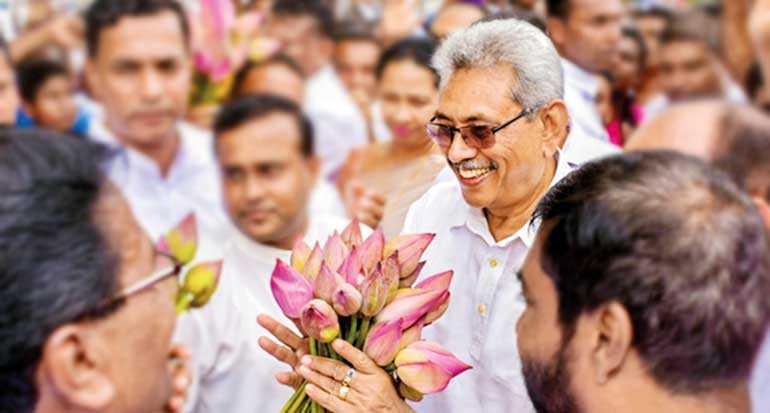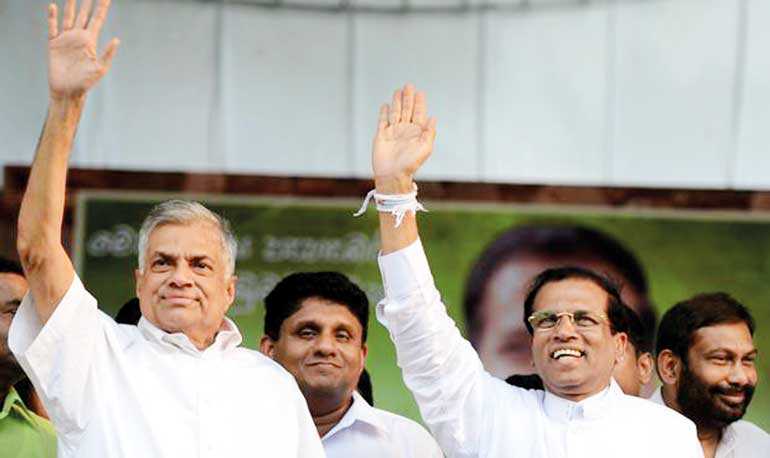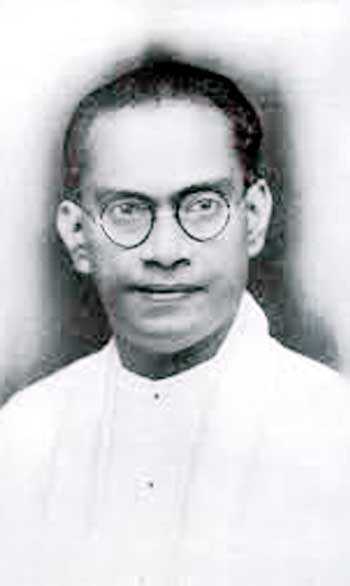Friday Feb 13, 2026
Friday Feb 13, 2026
Monday, 16 December 2019 01:00 - - {{hitsCtrl.values.hits}}



By Tisaranee Gunasekara
“Politics is not religion, or, if it is, then it is nothing but the Inquisition.” – Camus (The Rebel)
In Sri Lanka, fantasy rules.
A man is invited to Naga Lokaya (Cobra World) by its king, and is presented with 14 relics of the Buddha. The relics are brought to Kelaniya and placed on a special dais. A pious cobra emerges from the Kelani River to worship the relics. This denizen of the Naga Lokaya is caught and imprisoned in a 5000ml plastic water bottle. Both the relics and the captive cobra make it to the news.
The incident could have been dismissed as yet another example of fantasy-mongering that increasingly passes for Buddhism in Sri Lanka, those outbursts of mindless piety which are as frenzied as they are short-lived, but for three factors, all of them real, unlike the journey to the Cobra World.
First was the timing, exactly a week before the Presidential Election.
Second was the statement made by the Chief Incumbent of the Kelaniya temple linking l’affaire Cobra World to the Presidential Election. The arrival of relics courtesy Cobra King signals that Lanka will have a good leader by 2020, the monk opined to the media. Third was the political symbolism. When devotees came to worship the relics, they were presented with lotus buds (the lotus bud was the electoral symbol of the SLPP candidate Gotabaya Rajapaksa). Exploiting religious beliefs for political gain is a familiar Lankan (and global) phenomenon. But the melding of mindless piety and political ambition witnessed during the recent Presidential Election was unprecedented in both extent and crudity.
The Mahavamsa used an apocryphal take to render the survival of Buddhism dependent on the survival of the Sinhala race. During the Presidential Election campaign, Sinhala Buddhist monks used minority phobia to manufacture an unbreakable link between the survival of Sinhala Buddhism and the restoration of Rajapaksa rule. The election was presented as the last chance to save Sri Lanka for Sinhala Buddhists. As the rabble-rousing monk Galagoda Atte Gnanasara claimed, soon after he was freed from jail by a presidential pardon, “We are going to make a government of Sinhalese alone (Api thani Sinhala anduwak hadanawa)”. So it was done. When the new President held his investiture at Ruwanwelisaya, that ultimate symbol of Sinhala Buddhism, he was acknowledging this reality. He was elected as a Sinhala – if not Sinhala Buddhist – leader. Can he then govern as a Sri Lankan leader?
The Gotabaya Rajapaksa victory is being hailed by some as the new 1956; correctly so. But 1956 would not have happened had it not been for the politico-social upheaval caused by the rice price hike of 1953. SWRD Bandaranaike took the resulting discontent and directed it into an ethno-religious channel. Once elected, he tried to distance himself from the forces he himself unleashed, and paid the ultimate price.
Gotabaya Rajapaksa is unlikely to tread that path. SWRD Bandaranaike used an already existing extremist fringe for his benefit. The Rajapaksas created their own extremist fringe. Having being elected on a Sinhala Buddhist platform, Gotabaya Rajapaksa is likely to rule as a Sinhala Buddhist leader, irrespective of the cost to Sri Lanka.
A leader who won by appealing to all the worst and irrational impulses of the human mind cannot liberate himself from the demons he unleashed once in power; even if he tries to
The new landscape
Democracy dies by its own hand more often than it is killed. Religion and politics, racism and superstition, these are heady and powerful mixtures, but to be truly effective electorally they need economics as a binding agent.The Rajapaksas used race and religion cards at the 2015 presidential and parliamentary elections and lost, because they got the economics wrong. Had the Sirisena-Wickremesinghe government stayed true to its economic mandate, 2019 would have had a different ending.
The beginning of the end for the Sirisena-Wickremesinghe administration could be traced back to May 2016, when the Nation Building Tax was re-imposed and the VAT was increased to 15% in one fell swoop. The effect of this massive indirect tax hike was economic and psychological. An across-the-board price increase resulted. A storm of protests followed, including by small traders (a Lankan first).
The Government ignored the early warning signs. When the Supreme Court deemed the tax hike illegal because it was done outside the due process, the Government withdrew the proposal and brought it back via the Budget in November.
In their book, How Democracies Die, Harvard University professors Steven Levitsky and Daniel Ziblatt opine that the survival of a democracy that has elected an autocrat to power depends on whether the autocratic leader subverts democratic institutions or is constrained by them. Can the democratic institution resist the march away from democracy or do they crumble at the first touch?
The floating voters who had abandoned the Rajapaksas in 2015 for economic reasons (despite the best efforts of monks and astrologers) felt betrayed. Their politico-electoral repositioning was reflected in the drubbing the UNP and the SLFP got at the 2018 LG poll. Even this debacle didn’t make the Sirisena-Wickremesinghe administration realise the suicidal nature of its economic path. No course correction was effected; even the hugely unpopular fuel price formula was kept in place.
 |
Once elected, S.W.R.D Bandaranaike tried to distance himself from the forces he himself unleashed, and paid the ultimate price |
Democracy’s economic errors opened the floodgates of national-populism in Sri Lanka, as it has done in other parts of the world. An article in The Atlantic makes a telling point: “Right now, the four most populous democracies in the world are ruled by populists: Narendra Modi in India, Donald Trump in the United States, Joko Widodo in Indonesia, and Bolsonaro in Brazil.”1
It is not yet a month since the Presidential Election. In that short time, democratic deconstruction and majoritarian supremacism have made significant headway. There had been three physical attacks on media personnel; one website office was raided and two web journalists summoned to the CID. During the Presidential Election, SLPP members hooted at SLFP leaders who came to Gotabaya Rajapaksa’s meetings. Last week, that verbal expression of hateful contempt turned physical when Reginald Cooray was reportedly attacked by a group of SLPP supporters. Mobs are in ascendance, encouraged by the silence of the powers that be.
In another telling example, a dispute over finances between the Director of the Cancer Hospital, Dr. Wasantha Dissanayake and the Head of the non-profit Fight Cancer M.H.M. Mohamed has been turned into an outpouring of anti-Muslim hysteria. If there was a financial misappropriation, as the doctor alleges, he should have made a complaint to the police. Instead he is using the internet to incite anti-Muslim hysteria. A medical doctor and the head of one of the most important public hospitals in Sri Lanka is unashamed to use the most obscene language on Facebook under his own name. Consider the example he is setting. Doesn’t this herald the coming death of decency as a public and private value?
In one of his Facebook posts, Dr. Dissanayake says, “Is this a country gone to Mohammads? The President will discover all. He doesn’t go begging for minority votes.” The doctor’s Muslim-bashing is his doing. But the enabling environment in which it is happening was created by the outcome of the Presidential Election. This doctor, who is also a public servant, believes that he can display his racism in the crudest terms without suffering either societal opprobrium or official/legal consequences. What gives him that certitude?
One final example: A gang of SLPP supporters vandalised a public park in Homagama, according to the website SL Story. In a Facebook posting made on 8 December at 8.24pm, one of the vandals openly celebrated his deed: “We don’t want the parks built by Champika. Must destroy and build from the beginning.”2 Photographs of destruction accompanied the words. Like the doctor, this man too fears neither public opprobrium nor legal consequences. He too thinks he is safe, a hero who works.
A leader who won by appealing to all the worst and irrational impulses of the human mind cannot liberate himself from the demons he unleashed once in power, even if he tries to. Already, two pro-Government monks have publicly accused Milinda Moragoda and Dr. Nalaka Godahewa of the being Christian fundamentalist fifth columnists. An early reminder of the cannibalistic nature of extremism.
The beginning of the end for the Sirisena-Wickremesinghe administration could be traced back to May 2016, when the Nation Building Tax was re-imposed and the VAT was increased to 15%, in one fell swoop. The effect of this massive indirect tax hike was economic and psychological… Democracy’s economic errors opened the floodgates of national-populism in Sri Lanka, as it has done in other parts of the world
Perhaps nothing portends the new times than the manner in which the new Government and its supporters are responding to the alleged abduction of the Swiss Embassy employee. A section of the media seems to be in competition to become the ‘most unethical of them all’ by revealing the alleged victim’s name and family details. Ignoring her pitiful attempts to cover her face, she was photographed and the pictures flashed on print and electronic media. On the internet she is excoriated for being a Tamil and accused of being a Sinhalese masquerading as a Tamil. The alleged victim of abduction cum sexual assault has been turned, sans any facts or reasons, into a criminal deserving of neither pity nor justice.
In his meeting with media owners last week, President Rajapaksa proclaimed the abduction incident to be a fabrication. Defence Secretary and retired General Kamal Gunaratne is on record stating that the Tamil diaspora is behind the incident. The police, which is investigating the incident, comes under the Defence Ministry. What hope of an impartial inquiry? What chance for truth? What room for justice?
The road ahead
For all its faults, the Sirisena-Wickremesinghe administration created a democratic space within which the judiciary was free to mete out justice, the media was free to write and the police was relatively free to investigate.
Destroying that space by denuding its institutional foundations seems to be the new path forward. The humiliatingly punitive transfers given to the three top sleuths of the CID send a potent message up and down about the importance of conformism and costs of not doing so. Last week, Premier Rajapaksa presented a Cabinet paper to set up of a special presidential commission “to investigate those Government officials who conducted investigations into the conduct of other public officials who were targets of political witch-hunts during the last Government.”3 In Sri Lanka, presidential commissions (unlike Commissions of Inquiry) have been used by governments as instruments of vengeance against the political opponents. Given this history, the message would be loud and clear. Public officials, especially police officers, who had any involvement in any investigation/trial involving SLPP politicians or their supporters will be targeted.
For all its faults, the Sirisena-Wickremesinghe administration created a democratic space within which the judiciary was free to mete out justice, the media was free to write and the police was relatively free to investigate. Destroying that space by denuding its institutional foundations seems to be the new path forward
It is against this backdrop that the revamped CID will be investigating the alleged plot to assassinate President Gotabaya Rajapaksa or a member of his family. A Muslim man from Valachchanai is in custody and investigations are pending. Will this plot go the way of the faux Naxalite conspiracy of 1982 which was used by the J.R. Jayewardene government to imprison the SLFP’s best and brightest campaigners in time for the infamous referendum? Is this a prelude to the upcoming parliamentary election, the chosen path to reach the coveted two-thirds?
According to Gazette notification, 31 institutions including the Department of Immigration and Emigration, the Identity Card office, NGO Secretariat, Telecom Regulatory Commission, National Media Centre, National Building Research Institute and even the Weather Department have been placed under the Defence Ministry. Prime Minister Mahinda Rajapaksa has been gifted 88 institutions while Minister Chamal Rajapaksa has been granted 26 institutions. Since Chamal Rajapaksa is also the State Minister of Defence (no Cabinet minister has been appointed), the Rajapaksa brothers are in control of 145 institutions. Familial rule is back in style, and militarisation of civil spaces is on again.
Days before the Presidential Election, a well-known preacher monk started a fast unto death against the MCC agreement. The fast was given hyped publicity by the pro-SLPP media. Since the monk concerned had no history of rabble-rousing, and a reputation for piety, his stand against the MCC carried weight and gave some credence to the demented stories about the agreement as a tool of separation.
Asked about the MCC Agreement, the monk is reported saying that he had not read the treaty, had no time to study the implications of the treaty4. So this pious monk started a fast unto death against an agreement he knew nothing about. His opposition was based not on knowledge but on hearsay. The agreement was in the public domain, yet he didn’t think it was necessary to read it. Even now, he doesn’t see a problem with his actions.
The work to turn a flawed pluralist democracy into a Sinhala Buddhist raj is taking place in a landscape increasingly characterised by ‘degraded values and gangster morality’ (to quote Camus), and the deification of unreason.
In their book, ‘How Democracies Die’, Harvard University professors Steven Levitsky and Daniel Ziblatt opine that the survival of a democracy that has elected an autocrat to power depends on whether the autocratic leader subverts democratic institutions or is constrained by them. Can the democratic institution resist the march away from democracy or do they crumble at the first touch? Just a month after the Presidential Election, the Lankan answer is disturbingly, frighteningly clear.
1.What 46 populist leaders did to democracy – The Atlantic (https://www.theatlantic.com/ideas/archive/2018/12/hard-data-populism-bolsonaro-trump/578878)
2.Pohottu thugs vandalise Homagama park – SL Story (https://www.slstory.com/?p=53463)
3.Special probe, new laws, to protect state officers from political reprisal – Daily News (http://www.dailynews.lk/2019/12/07/local/205049/special-probe-new-laws-protect-state-officers-political-reprisal)
4.I Protested Without Reading the MCC Agreement – SL Story (https://www.slstory.com/?p=53354)